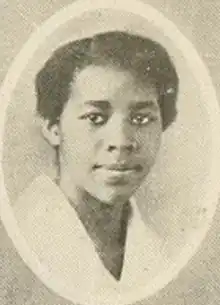Idabelle Yeiser | |
|---|---|
 Idabelle Yeiser, from the 1920 yearbook of Montclair State Normal School | |
| Born | about 1900 |
| Died | September 24, 1954 |
| Occupation(s) | Educator, college professor, writer, poet |
Idabelle Yeiser (born c. 1900, died 24 September 1954) was an American woman poet, writer, and educator, who was part of the New Negro Movement in Philadelphia.[1][2][3]
Early life and education
Yeiser was the daughter of John G. Yeiser, a pastor in the African Methodist Episcopal Church.[4] She graduated from Asbury Park High School in 1918,[5] and from the New Jersey State Normal School at Montclair in 1920.[6] She earned a bachelor's degree at the University of Pennsylvania, with further studies in Paris and Madrid.[7][8] In 1940, she earned a doctorate in education at Teachers College, Columbia University.[9]
Career
Yeiser taught school and private language classes[10] in Camden, New Jersey, and in Philadelphia.[11] She was known for teaching with puppets.[12] She was an education professor at Dillard University from 1943 to 1946,[9][13] was a professor of education at Cheyney College in 1950,[14] and was an assistant professor of education at Brooklyn College in the 1950s.[15]
In the 1930s, Yeiser was a prize-winning horsewoman in Philadelphia.[16] She was an interviewer with the Mississippi Health Project, working with Melva L. Price and Dorothy Boulding Ferebee, among others.[17] In 1945, she was a consultant to the Oklahoma City Negro Teachers' Institute.[18]
Yeiser was active in the peace movement. She was a member of the Philadelphia chapter of the Women's International League for Peace and Freedom, and in the early 1930s had a newspaper column in the Philadelphia Tribune, titled "Peace Corner."[19] In summer 1947, she was one of six American representatives at a UNESCO seminar in France.[20][21]
Works
- "Echoes of Toulouse, France" (1926, The Crisis)[11]
- Moods: A Book of Verse (1937)
- "The Why and How of Teaching French to Little Children" (1939, The Modern Language Journal)[10]
- The Curriculum as an Integrating Force for Ethnic Variations (1943)[22]
- "The Teacher Beyond the Textbook" (1944, The Southwestern Journal)
- Lyric and Legend (1947)
- "Notes on a UNESCO Conference" (1949)[23]
- "Two Student Teaching Programs" (1953, Journal of Teacher Education)[15]
- "An Essay on Creativity" (1953, Arts and Activities)[24]
Personal life
Yeiser died in 1954.
References
- ↑ Bracks, Lean'tin L. (2014). "Yeiser, Idabelle". In Lean'tin L. Bracks; Jessie Carney Smith (eds.). Black Women of the Harlem Renaissance Era. Rowman & Littlefield Publishers. p. 258. ISBN 978-0-8108-8543-1.
- ↑ West, Sandra L. (2003). "Philadelphia and the Harlem Renaissance". In Aberjhani; Sandra L. West (eds.). Encyclopedia of the Harlem Renaissance. Infobase Publishing. p. 263. ISBN 978-1-4381-3017-0.
- ↑ Lorraine Elena Roses; Ruth Elizabeth Randolph (1996). "Biographical Notes: Idabelle Yeiser". Harlem's Glory: Black Women Writing, 1900-1950. Harvard University Press. p. 536. ISBN 978-0-674-37269-6.
- ↑ Yeiser, John G. (1928). Texts and Talks: By the Late Rev. John G. Yeiser. A.M.E. Book Concern.
- ↑ "Graduate Entertains". Asbury Park Press. 1918-06-29. p. 2. Retrieved 2022-02-06 – via Newspapers.com.
- ↑ "Normal School Graduates". The Montclair Times. 1920-06-12. p. 18. Retrieved 2022-02-06 – via Newspapers.com.
- ↑ "New Jersey School Teachers Sail for European Vacation". The New York Age. 1925-07-03. p. 2. Retrieved 2022-02-06 – via Newspapers.com.
- ↑ "Educator to Speak at Harvard". California Eagle. 1943-07-08. p. 2. Retrieved 2022-02-06 – via Newspapers.com.
- 1 2 "Dr. Idabelle Yeiser Becomes Professor of Education at Dillard". The New York Age. 1943-04-24. p. 4. Retrieved 2022-02-06 – via Newspapers.com.
- 1 2 Yeiser, Idabelle (1939). "The Why and How of Teaching French to Little Children". The Modern Language Journal. 23 (8): 591–593. doi:10.1111/j.1540-4781.1939.tb02850.x. ISSN 1540-4781.
- 1 2 Yeiser, Idabelle (August 1926). "Echoes of Toulouse, France". The Crisis. 32: 191–192 – via Internet Archive.
- ↑ "Her Puppets are Linguists". The Philadelphia Inquirer. 1952-03-09. p. 172. Retrieved 2022-02-06 – via Newspapers.com.
- ↑ "Teachers to Hear Rep. Judd and Dr. Yeiser". The Belleville News-Democrat. 1948-03-17. p. 5. Retrieved 2022-02-06 – via Newspapers.com.
- ↑ "St. Matthew's Plans Women's Day Service". The Morning News. 1950-01-14. p. 12. Retrieved 2022-02-06 – via Newspapers.com.
- 1 2 Yeiser, Idabelle (December 1953). "Two Student Teaching Programs". Journal of Teacher Education. 4 (4): 300–302. doi:10.1177/002248715300400413. ISSN 0022-4871. S2CID 145488427.
- ↑ Penn, Franklin (1936-06-13). "Idabelle Yeiser Wins First Place". The Pittsburgh Courier. p. 8. Retrieved 2022-02-06 – via Newspapers.com.
- ↑ Alpha Kappa Alpha Sorority, The 1938 Mississippi Health Project (AKA Publications No. 5, December 1938).
- ↑ "Dillard Educator Back from Tour". The Pittsburgh Courier. 1945-03-24. p. 11. Retrieved 2022-02-06 – via Newspapers.com.
- ↑ Plastas, Melinda (2011). A band of noble women : racial politics in the women's peace movement. Internet Archive. Syracuse, N.Y. : Syracuse University Press. pp. 37, 159, 177. ISBN 978-0-8156-3257-3.
- ↑ Albersheim, Anne (1948-02-18). "Pupils Hear Minister, Doctor on Tolerance". Asbury Park Press. p. 13. Retrieved 2022-02-06 – via Newspapers.com.
- ↑ "American Educators Appointed for UNESCO Summer Seminar". The Department of State Bulletin. 17: 181. July 27, 1947 – via Internet Archive.
- ↑ Yeiser, Isabelle (1943). The Curriculum as an integrating force for ethnic variations. Cambridge, Etats-Unis d'Amérique: Massachusetes : Harvard University.
- ↑ Yeiser, Idabelle (1949). "Notes on a UNESCO Conference". The Journal of Education. 132 (2): 44–47. doi:10.1177/002205744913200207. ISSN 0022-0574. JSTOR 42749618. S2CID 189044265.
- ↑ Yeiser, Idabelle (May 1953). "An Essay on Creativity". Arts and Activities. 33: 36–37, 49 – via Internet Archive.